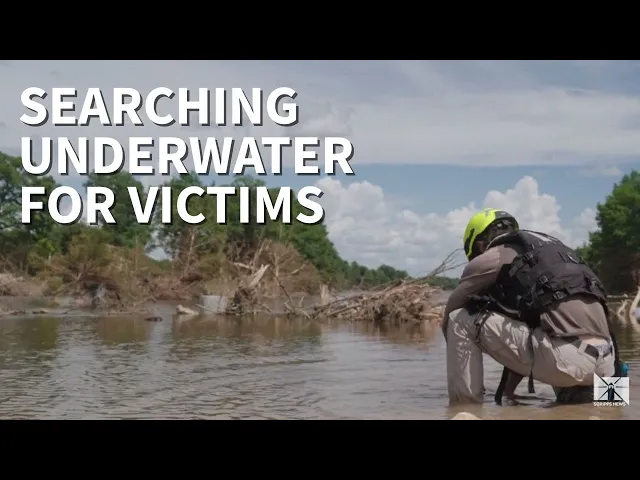Inside the harrowing search: AI and Sonar used to find flood victims in Texas

AI's crucial role in rescue operations
When disaster strikes, every minute counts. This core principle has never been more evident than in Texas's recent flooding emergency, where a synergy of cutting-edge technologies and human expertise is revolutionizing search and rescue operations. The remarkable deployment of artificial intelligence alongside traditional sonar equipment is creating a powerful new paradigm for locating and saving lives in the most challenging conditions imaginable.
Key Points
-
Rescue teams are combining advanced AI technology with traditional sonar to dramatically improve their ability to locate flood victims in treacherous conditions, creating a "force multiplier" effect that extends their capabilities beyond what was previously possible.
-
The AI systems can rapidly differentiate between human bodies and debris underwater, analyzing sonar data in real-time to identify potential victims with unprecedented speed and accuracy – a task that would otherwise require extensive human expertise and time.
-
These technological advancements don't replace human rescuers but instead augment their capabilities, allowing teams to cover vastly more search area while maintaining the essential human judgment needed in complex rescue scenarios.
The Transformative Power of AI in Crisis Response
The most profound insight from this technological evolution is how AI transforms from an abstract concept to a life-saving tool in emergency response. When implemented thoughtfully, AI doesn't simply automate tasks – it fundamentally changes what's possible in time-critical situations. The sonar technology itself isn't new, but the addition of artificial intelligence creates an exponential leap in effectiveness, allowing teams to search underwater environments with unprecedented speed and accuracy.
This matters enormously in the broader context of emergency management. As climate change increases the frequency and severity of flooding events worldwide, the ability to respond effectively becomes ever more crucial. We're witnessing the emergence of a new standard in disaster response where technology enables rescuers to cover more ground with greater precision while maintaining the human judgment that remains irreplaceable in complex situations.
Beyond the Technology: The Human Element
What the video doesn't fully explore is the profound psychological impact this technology has on rescue personnel. Traditional search methods in flood situations are not only physically demanding but emotionally devastating. Rescuers must painstakingly search murky, dangerous waters, often finding victims too late. The trauma this creates for first responders is substantial and cumulative.
AI-assisted searches potentially reduce this trauma in two ways. First, by finding victims
Recent Videos
How To Earn MONEY With Images (No Bullsh*t)
Smart earnings from your image collection In today's digital economy, passive income streams have become increasingly accessible to creators with various skill sets. A recent YouTube video cuts through the hype to explore legitimate ways photographers, designers, and even casual smartphone users can monetize their image collections. The strategies outlined don't rely on unrealistic promises or complicated schemes—instead, they focus on established marketplaces with proven revenue potential for image creators. Key Points Stock photography platforms like Shutterstock, Adobe Stock, and Getty Images remain viable income sources when you understand their specific requirements and optimize your submissions accordingly. Specialized marketplaces focusing...
Oct 3, 2025New SHAPE SHIFTING AI Robot Is Freaking People Out
Liquid robots will change everything In the quiet labs of Carnegie Mellon University, scientists have created something that feels plucked from science fiction—a magnetic slime robot that can transform between liquid and solid states, slipping through tight spaces before reassembling on the other side. This technology, showcased in a recent YouTube video, represents a significant leap beyond traditional robotics into a realm where machines mimic not just animal movements, but their fundamental physical properties. While the internet might be buzzing with dystopian concerns about "shape-shifting terminators," the reality offers far more promising applications that could revolutionize medicine, rescue operations, and...
Oct 3, 2025How To Do Homeless AI Tiktok Trend (Tiktok Homeless AI Tutorial)
AI homeless trend raises ethical concerns In an era where social media trends evolve faster than we can comprehend them, TikTok's "homeless AI" trend has sparked both creative engagement and serious ethical questions. The trend, which involves using AI to transform ordinary photos into images depicting homelessness, has rapidly gained traction across the platform, with creators eagerly jumping on board to showcase their digital transformations. While the technical process is relatively straightforward, the implications of digitally "becoming homeless" for entertainment deserve careful consideration. The video tutorial provides a step-by-step guide on creating these AI-generated images, explaining how users can transform...
